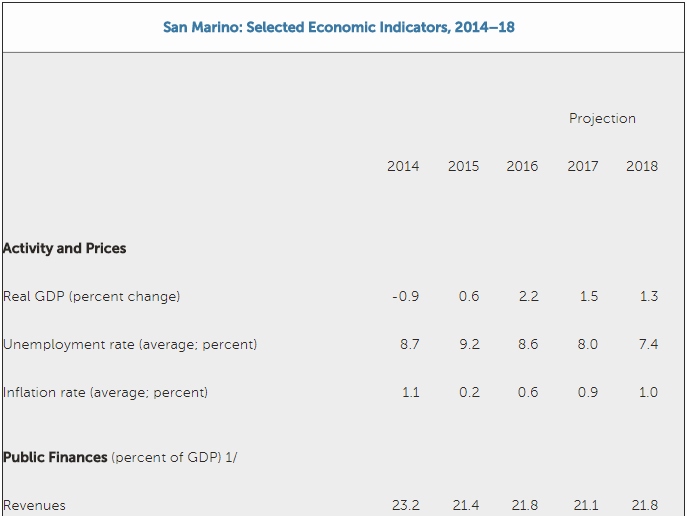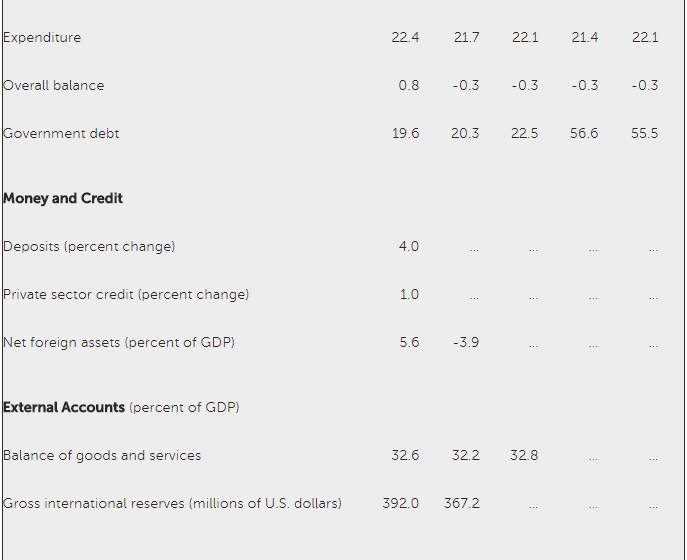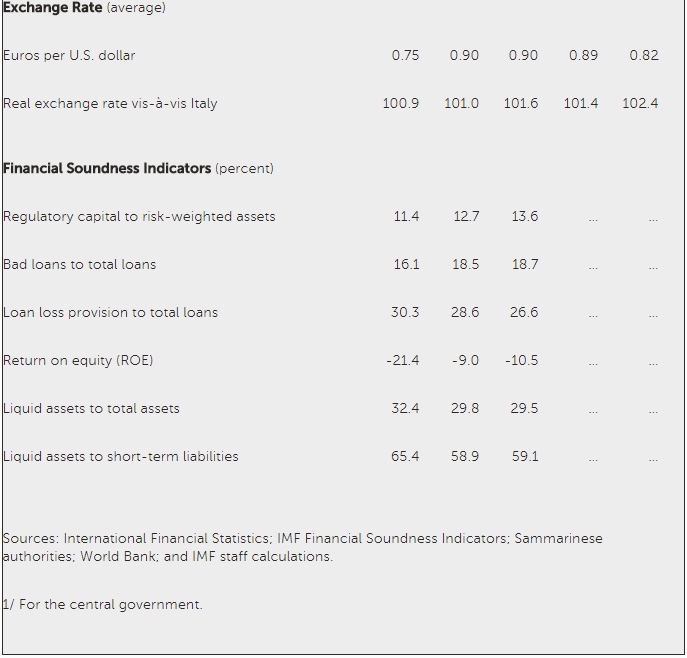Republic of San Marino: IMF Executive Board Concludes 2018 Article IV Consultation
On March 22, 2018, the Executive Board of the International Monetary Fund (IMF) concluded the Article IV consultation with the Republic of San Marino.
San Marino’s economy rebounded in 2016, on the back of recovering domestic demand and important gains in employment. However, the growth momentum slowed in 2017 amid financial sector uncertainties around a sizable loss at the largest bank and a closure of a small bank.
Only moderate growth is projected in the near and medium term. The economy is projected to grow at 1.3 percent in 2018, driven by domestic demand. Private consumption is expected to recover gradually, and an externally-financed investment project will add a significant boost to investment, which otherwise lacks support from the deleveraging banking sector. Unresolved banking sector vulnerabilities could weight on growth prospect.
San Marino continues to pursue the path of internationalization and strives to improve transparency and the business environment. Despite recent initiatives in these areas, challenges remain to diversify the economy beyond banking and support stronger and sustained growth. At the same time, the banking system continues to face weak balance sheets and high non-performing loans while financial sector legacy costs have burdened public finances. Fiscal adjustments are envisaged in the 2018 budget, but the size of deficit and public debt is highly uncertain until the ongoing update of the Asset Quality Review is completed and identifies the full cost of banking sector repair.
Executive Board Assessment
The Executive Directors welcomed San Marino’s recovery in economic activity in 2016, but noted that momentum slowed in 2017 and considerable challenges remain to address banking system vulnerabilities, which continue to weigh on growth prospects. In this regard, Directors concurred that a comprehensive strategy and decisive actions are needed to safeguard financial stability and limit further costs of the banking sector clean-up to public finances. In addition, they encouraged measures to preserve debt sustainability, and structural reforms to diversify the economy and support growth. Directors emphasized that the reform agenda is demanding and requires strong commitment from all stakeholders.
Directors stressed the importance of restoring banking sector soundness and dealing with the very high stock of nonperforming loans (NPLs). They urged the authorities to complete the recently initiated update of the Asset Quality Review (AQR), noting that the AQR is critical in clarifying the cost of banking sector repair. The process ahead should include upfront loss recognition, prompt bank recapitalization, and reduction of NPLs. Directors considered that a credible strategy for Cassa di Risparmio della Repubblica di San Marino (CRSM) should entail restructuring to return the bank to viability. At the same time, they underscored the need to strengthen central bank functions and bank oversight to mitigate future risks and to adopt high standards of governance, accountability, and transparency.
Directors agreed that a fiscal strategy is needed to safeguard debt sustainability while securing resources for pro-growth policies. Although the fiscal cost of bank recapitalization is highly uncertain, Directors saw the need for sustained fiscal measures, including increasing tax revenue through reform of indirect taxation, and improving the quality and efficiency of spending. They noted that pension reform could help free resources for other areas and saw scope for better prioritization within the current reform proposal. Directors also noted that developing debt management capacity while establishing access to external financing would help enhance the government’s ability to respond to shocks.
Directors encouraged structural reforms to improve the business environment, reduce the cost of doing business, and increase labor market flexibility to diversify the economy beyond the financial sector and attract more foreign investment. They welcomed the progress made on the AML/CFT agenda and encouraged the authorities to continue improving the effectiveness of measures to safeguard financial integrity, including by strengthening risk-based supervision of banks.
Directors welcomed the recent initiative to compile balance of payments statistics and encouraged the authorities to continue improving data provision and compliance in line with international standards.



Source: International Monetary Fund
- 365 reads
Human Rights
Fostering a More Humane World: The 28th Eurasian Economic Summi

Conscience, Hope, and Action: Keys to Global Peace and Sustainability

Ringing FOWPAL’s Peace Bell for the World:Nobel Peace Prize Laureates’ Visions and Actions

Protecting the World’s Cultural Diversity for a Sustainable Future

Puppet Show I International Friendship Day 2020

